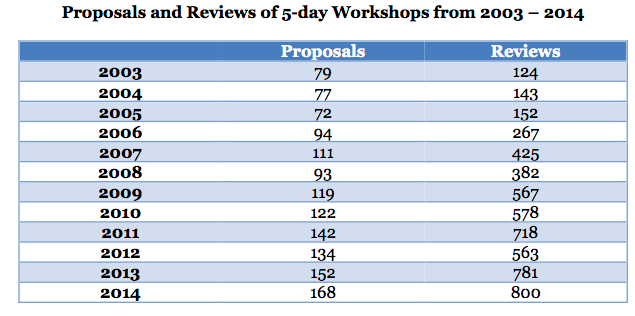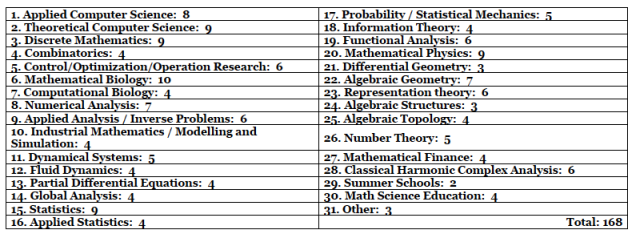2015 BIRS scientific program in Banff (and possibly Oaxaca): Call for proposals
La version française suit ci-dessous. La versión española sigue abajo.
The Banff International Research Station for Mathematical Innovation and Discovery (BIRS) is now accepting proposals for its 2015 program. BIRS will again be hosting a 48-week scientific program at its station in Banff. There is also a possibility (to be confirmed later) that BIRS will be running an additional 20-25 workshops at its developing new station in Oaxaca, Mexico.
The status and state of readiness of the new research station at Oaxaca is still awaiting final commitments from various private and public sponsors. We are aiming to have the facility open and ready to host an augmented BIRS program as soon as 2015. We shall keep the scientific community informed about this exciting potential to increase the BIRS opportunities. For an informal description of the project and its rationale, refer to: http://nghoussoub.com/2013/04/19/tell-me-about-el-casa/
The Station at Banff (and eventually the one in Oaxaca) provides an environment for creative interaction and the exchange of ideas, knowledge, and methods within the mathematical, statistical, and computing sciences, and with related disciplines and industrial sectors. Each week, the station hosts either a full workshop (42 people for 5 days) or two half-workshops (each with 21 people for 5 days). As usual, BIRS provides full accommodation, board, and research facilities at no cost to the invited participants, in a setting conducive to research and collaboration.
Full information, guidelines, and online forms are available at the BIRS website: http://www.birs.ca
The deadline for 5-day Workshop and Summer School proposals is Friday September 27, 2013.
In addition BIRS will operate its Research in Teams and Focused Research Groups programs, which allow smaller groups of researchers to get together for several weeks of uninterrupted work at the station. September 27, 2013 is also the preferred date to apply for these programs. However, proposals for projects involving Research in Teams or Focused Research Groups can be submitted at any time -- subject to availability -- they must be received at least 4 months before their requested start date.
Proposal submissions should be made using the online submission form. Please use: https://www.birs.ca/proposals
Nassif Ghoussoub, Scientific Director,
The Banff International Research Station
La station internationale de recherche en sciences mathématiques de Banff (BIRS) lance un appel à projets pour l’année 2015. Le centre accueillera de nouveau un programme scientifique de 48 semaines. BIRS compte également ouvrir un nouveau centre à Oaxaca (Mexique) et y accueillir 20 à 25 ateliers supplémentaires (sous réserve de confirmation ultérieure).
Nous espérons que le nouveau centre de Oaxaca sera prêt à fonctionner et à accueillir ces programmes supplémentaires dès 2015. Cependant, nous attendons encore que certains sponsors publics et privés confirment leur engagement, et l'état d'avancement des nouvelles installations en dépend bien évidemment. Nous tiendrons la communauté scientifique au courant au fur et à mesure que s’ouvrent ces possibilité nouvelles et que se développe leur potentiel. Pour une description préliminaire du projet, nous renvoyons à http://nghoussoub.com/2013/04/19/tell-me-about-el-casa/
La mission de BIRS est de mettre à la disposition de la communauté scientifique internationale un environnement de recherche qui favorise les interactions et les échanges d'idées et de connaissances entre les membres des communautés mathématiques, statistiques, informatiques ainsi que leurs applications dans les sciences et dans le secteur industriel.
En 2015, BIRS compte accueillir au moins un atelier standard (42 personnes pour 5 jours) soit deux demi- ateliers (21 personnes pour 5 jours) par semaine. BIRS fournit aux participants invités l’infrastructure de recherche appropriée, ainsi que le logement et les repas dans un cadre convivial, propice aux échanges d’idées et aux collaborations scientifiques.
Des informations complètes ainsi que les formulaires à remplir en ligne sont disponibles sur le site Internet http://www.birs.ca
La date limite pour le dépôt des dossiers concernant les ateliers et les écoles d'été est fixée au vendredi 27 septembre 2013.
De plus, BIRS continue de mener ses programmes de Recherche en Equipes (RIT) et de Groupes de Recherche (FRG), qui permettent à des équipes de chercheurs de se retrouver dans la station pour plusieurs semaines afin de mener à bien un projet de recherche en collaboration. Les dossiers de demandes pour ces programmes doivent -de préférence- être déposés aussi avant le 27 septembre 2013. Cependant, les dossiers concernant ces deux derniers programmes (FRG et RIT) seront également acceptés à tout autre moment à condition qu’ils soient soumis au moins 4 mois avant la date à laquelle le projet est supposé débuter.
Les dossiers de candidature doivent être soumis sur Internet à l'adresse suivante: https://www.birs.ca/proposals
Nassif Ghoussoub
Directeur, Banff International Research Station
La Estación de Investigación Internacional de Banff para la Innovación y el Descubrimiento (BIRS) matemático esta aceptando propuestas para su programa de 2015. El centro recibirá nuevamente un programa científico de 48 semanas . BIRS cuenta igualmente con abrir un nuevo centro en Oaxaca ( México) donde podrá recibir de 20 a 25 talleres adicionales (bajo reserva de confirmación ulterior).
Contamos con que el nuevo centro de Oaxaca esté listo para iniciar su funcionamiento y para recibir estos programas adicionales a partir de 2015. Sin embargo esperamos aún que ciertos apoyos públicos y privados confirmen su compromiso, ya que el estado de avance de las nuevas instalaciones depende evidentemente de esto. Mantendremos informada a la comunidad científica de los avances de este prometedor proyecto., Para una descripción preliminar del proyecto los reenviamos a http://nghoussoub.com/2013/04/19/tell-me-about-el-casa/
La estación tiene como misión proporcionar un ambiente de interacción creativa y de intercambio de ideas, conocimiento y métodos dentro de las ciencias matemáticas, estadísticas y computacionales así como de disciplinas relacionadas y de sectores industriales. Cada semana, la estación tendrá o un taller completo (42 personas por 5 días) o bien, dos talleres parciales (cada uno con 21 personas por 5 días). Como es la costumbre, BIRS provee la infraestructura de investigación apropiada, así como el alojamiento y las comidas para los participantes, en un marco de convivialidad , propicio al intercambio de ideas y a las colaboraciones científicas.
Mas información, reglas y formatos estan disponibles en el sitio del BIRS: http://www.birs.ca
La fecha limite para propuestas de talleres de 5 días y la escuela de verano es el Viernes, 27 de Septiembre, 2013.
Ademas de esto,, BIRS propicia trabajos de equipo y en programas de grupos de investigación enfocados a un tema en especial, lo cual permite que los investigadores se reúnan durante varias semanas sin interrupciones en la estación. El 2 de septiembre de 2013 es también el día más conveniente para solicitar estos programas. Sin embargo, este tipo de propuestas pueden ser presentadas en cualquier momento -- sujeto a disponibilidad –y deberán ser recibidos por lo menos 4 meses antes del día propuesto para el inicio.
Las propuestas deberían hacerse por medio del formato en linea que se encuentra en: https://www.birs.ca/proposals
Nassif Ghoussoub
Director Científico, Estación de Investigación Internacional de Banff
Nassif Ghoussoub re-appointed as Scientific Director of BIRS
Nassif Ghoussoub has been re-appointed to a five-year term as Scientific Director of the Banff International Research Station (BIRS) beginning July 1, 2013.
"Under Ghoussoub's leadership BIRS has evolved to become one of the leading research institutions in the world," said Doug Mitchell, Chair of the BIRS Board of Directors. "BIRS is currently looking for ways to further expand opportunities for the mathematical sciences and we are extremely fortunate that Dr. Ghoussoub has agreed to continue to lead us into this next phase."
Dr. Ghoussoub is a Professor of Mathematics and a Distinguished University Scholar at the University of British Columbia. He has been a fellow of the Royal Society of Canada since 1993 and a fellow of the American Mathematical Society since 2012. For his research contributions he has received many awards including the Coxeter-James prize and the Jeffrey-Williams prize of the Canadian Mathematical Society.
Dr. Ghoussoub has been acknowledged worldwide for his many contributions to building Canadian and international research capacity and infrastructure, such as his role in the founding of the Pacific Institute for the Mathematical Sciences, the Mitacs network of centres of excellence and the Banff International Research Station. Among his most recent awards are the Queen Elizabeth Diamond Jubilee Medal and the David Borwein Distinguished Career Award. He is a recipient of a Doctorat Honoris Causa from the Université Paris-Dauphine, and was recently invited to receive the degree of Doctor of Science from the University of Victoria.
Jean-Pierre Bourguignon Honoured by Canadian Math Institute Directors
The 2014 Scientific Program
We are pleased to announce the 2014 Scientific Program at BIRS!
Since its inception almost 10 years ago, the number of proposals submitted to BIRS went from 79 in 2003 (its inaugural year) to 168 this year. The extraordinary reaction to the opportunities at BIRS has led to extremely high quality competitions for the 48 slots that the Station runs every year.

This year’s competition for the 2014 program received 168 proposals submitted by 382 applicants. The selection process involved 800 evaluations by 412 international peer reviewers. By the end of the review process, 44 proposals were accepted for full 5-day workshops with 42 researchers, and 8 for concurrent 5-day workshops with 22 researchers.
The complete list is here: 2014 5-Day Workshops
This year’s proposals were catalogued in the following 31 categories:

The committee first reviews each category, linearly ranking the proposals within it. Proposals are then selected by taking the top one or two in each category. In this way — and so long as there are first-rate proposals in each area — a distribution across the mathematical sciences and their applications is maintained. The BIRS Program Committee ranks proposals by scientific excellence and relevance alone, without regard for the geographical origin of the proposal. The commitment of the organizers is also a key criterion in the selection process. In return, the limited number of allowed participants forces the organizers to continue adhering to the highest standards.
The world’s scientific community owes a great deal to the ~30 members of the BIRS Scientific Advisory Board who have done a tremendous job reviewing the proposals in their own area of expertise and inputing their comments online. But the greatest deal of gratitude is owed to the 10 members of the Program Committee who read all 168 proposals, dissected all 800 reviews by peers, and who had to meet in person on a week-end away from home and family, and deliberate for long hours in order to make the final selection in a very competitive year.
Organizers have their preferences for when they would like to run their workshops. So, we ask them to submit their 5 top preferences as well as their “impossible dates”. Once the workshop selection is made, we feed their time preferences into a Monte-Carlo based computer program, which tries to maximize the number of favorable assignments. After running 10-million iterations for about 12 hours, we were happy to see that 82.69% of this year’s proposals will have at least one of their 5 preferred choices. Our sincere apologies to those who did not get one of their preferred dates.





